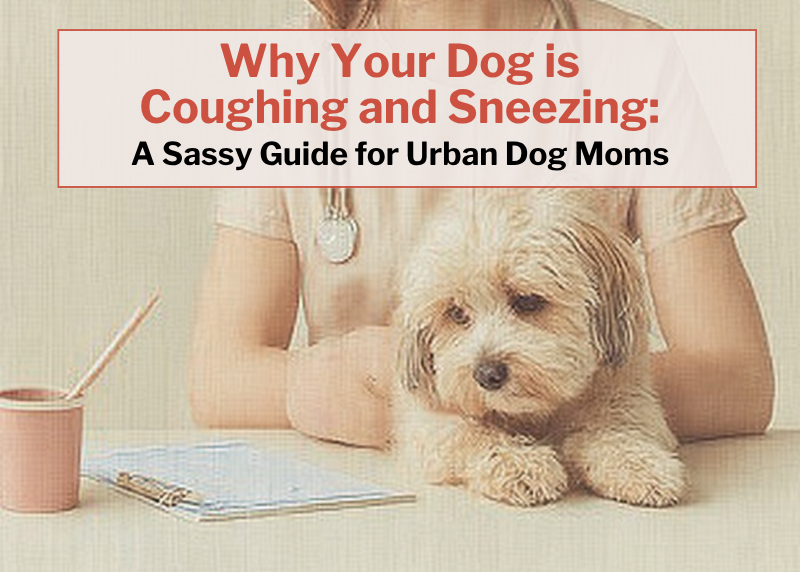If your dog is coughing and sneezing, take a deep breath (ideally not too close to their snout right now). You’re not alone, and it’s not always a code-red emergency. In fact, there are a surprising number of reasons your furry friend might sound like they’re auditioning for a role in a canine soap opera.
Is It Serious or Just a Pup With the Sniffles?
As new pet parents, especially us apartment-dwelling, Amazon Prime-using, boutique-treat-buying dog moms, it’s easy to panic at every sniffle. But here’s the deal: while some symptoms may signal bigger health issues, others are just your pup’s normal response to everyday life. Think: dust bunnies, air fresheners, or even a piece of grass lodged somewhere it shouldn’t be.
We’re breaking it all down for you, no vet degree required. (But don’t worry, we’ll also tell you when it’s time for that all-important vet visit.)
Also wondering if your dog’s constant itching is due to seasonal shedding? Find out here!
1. The Most Common Causes (and Yes, It’s Usually Gross)
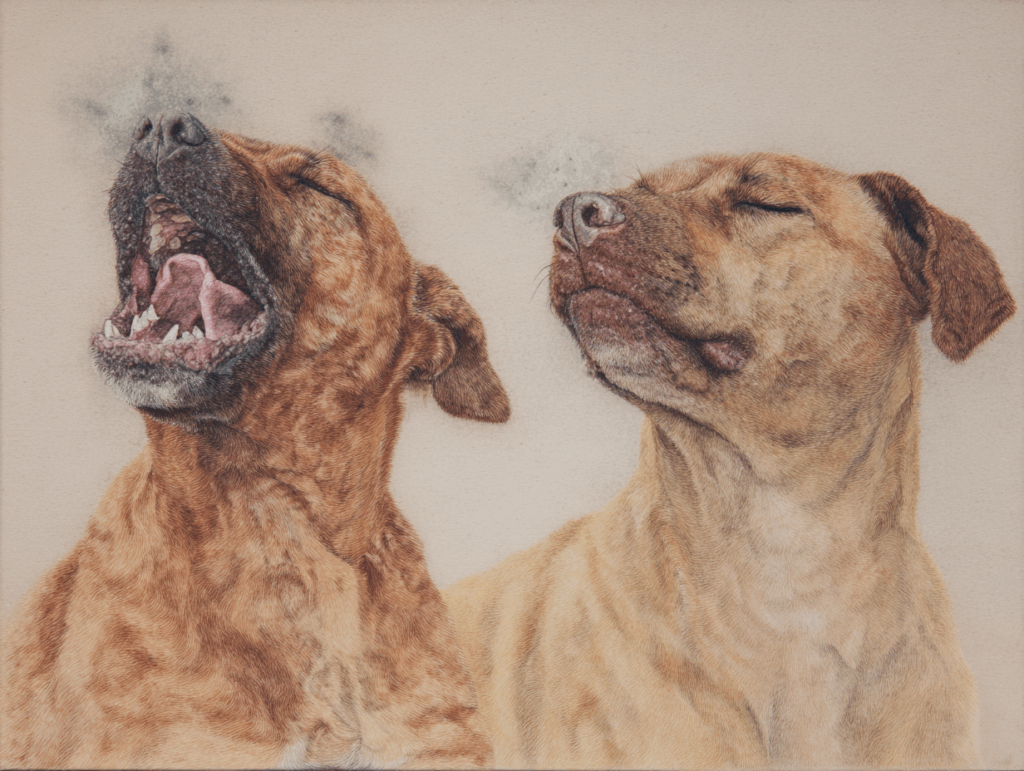
Let’s kick things off with the most common causes that your pup might be hacking, sneezing, or sounding like they’re trying to start a lawnmower.
If your pup has recently had a blast at dog parks, the groomer, or a boarding facility, they may have picked up kennel cough (aka infectious tracheobronchitis, but let’s not make it sound scarier than it is). This highly contagious condition is like a doggy version of the common cold, and it spreads faster than hot gossip at brunch.
You’ll notice a dry, hacking sound that seems like your pup is trying to clear their throat after a night out. It’s annoying, for sure, but usually clears up with rest, fluids, and possibly some veterinary treatment if symptoms persist. One of the main respiratory infections that affects social pups, it’s the prime suspect after a wild weekend of tail-chasing with friends.
Reverse Sneeze: Not Actually a Sneeze, but Still a Whole Performance
Ever seen your dog make a snorty noise like they’re inhaling a noodle through their nose? Congrats—you’ve witnessed a reverse sneeze. Despite the dramatic display, reverse sneezing is typically harmless and more common in small dogs and flat-faced dogs (lookin’ at you, Frenchies).
It’s caused by irritation in the throat or upper airways, often triggered by things like air fresheners, pollen, or even excitement. If it happens occasionally and stops on its own, you can usually chalk it up to “just one of those dog things.” But if your pup seems uncomfortable, talk to your vet—it could be related to a sore throat or something more serious.
Can you give your dog Zyrtec for seasonal allergies? We got the scoop for you!
Good Ol’ Dog Coughing and Sniffles
Sometimes, your dog coughs because they’ve got a mild upper respiratory infection, the kind of thing that comes with a runny nose, regular sneeze, or even watery eyes and some nasal discharge. Think of it like a doggy cold. These usually resolve on their own, but if your pup’s nose starts looking like a leaky faucet or the cough hangs around for more than a week, it’s worth checking in with your vet.
A Quick Note About Sniffle Swapping at the Park
Let’s be real: dog parks are fun, but they’re also like the kindergarten classroom of canine germs. Between the shared water bowls, sniff-fests, and full-body wrestling matches, your pup is exposed to a smorgasbord of bacteria and viruses. That’s why sudden dog coughing after a park visit isn’t uncommon, and neither is a dramatic reverse sneeze on the car ride home.
This is what you need to know about dog parks and puppies.. is it safe?
2. Other Culprits Lurking in the Nose and Throat

Not every honk or snort is a full-on crisis; sometimes, it’s just your dog’s nose doing… weird nose things. But let’s peek into the possibilities that could be hiding in those adorable dog’s nasal passages.
Mucus, Mites & Mysterious Gunk
A runny nose might seem innocent, but when it’s paired with thick nasal discharge, watery eyes, or goopy eye discharge, it’s time to investigate. These symptoms could point to nasal mites, which sound like something out of a horror movie but are unfortunately very real.
These tiny pests set up camp in your furry friend’s nose, causing sneezing, snorting, and general nasal drama. And guess what? Mites love a good social life—they’re contagious. A round of veterinary care and anti-parasitic treatment usually does the trick.
Foreign What-Now?
Dogs are explorers—especially with their noses. So it’s not unusual for them to inhale a rogue blade of grass, dirt, or something labeled “Do Not Inhale” (because of course). This kind of foreign material or foreign body can cause irritation, sneezing fits, and even bloody discharge.
Your vet might need to peek into those upper airways with a scope if the object doesn’t work its way out. It’s one of those times when your “video of your dog” doing the weird thing can help speed up the diagnosis!
Not to Be Dramatic, But It Could Be a Tumor
Okay, deep breath: while rare, nasal tumors are one of the more serious signs of an underlying respiratory condition. These can cause persistent sneezing, bleeding, and facial swelling—none of which are “wait and see” symptoms.
Your vet may recommend imaging like X-rays or a CT scan to get to the bottom of things. And no, Googling pictures of it at 2 a.m. will not help you sleep. Trust the pros.
3. Coughs That Are (Sadly) More Than Just a Noise

So your pup’s cough isn’t going away. It’s not just a post-zoomie wheeze, and it’s definitely not cute anymore. Let’s talk about what might be happening if your dog’s soundtrack has turned into a daily hackfest.
Chronic Bronchitis: A Long-Term, Low-Key Buzzkill
If your dog has a persistent cough that lingers for a long period of time, especially one that sounds dry and raspy, they could be dealing with chronic bronchitis. This condition means your dog’s airways are inflamed, making it harder for air to flow and easier for you to panic.
The cause? Sometimes it’s unknown (which is rude, honestly), but underlying causes like allergies, irritants, or even previous respiratory infections can play a role.
Tracheal Collapse: The Tiny Throat Drama
Raise your hand if you have a Yorkie or Chihuahua. ✋ These small dogs are absolute queens, but they’re also more prone to tracheal collapse. That’s when the cartilage rings that support the windpipe start to weaken, leading to a honking cough that sounds like your dog is trying to impersonate a goose.
It’s most noticeable when they get excited, pull on their leash, or bark too hard. While it can sound terrifying, it’s often manageable with weight control, a harness (ditch the collar!), and sometimes cough suppressants or medication.
This is a great all-around harness for any size or breed dog.
Laryngeal Paralysis: More Than Just a Tongue Twister
This one’s rarer, but worth mentioning—especially if your dog is older or a larger breed. Laryngeal paralysis happens when the nerves controlling the vocal cords become weak or stop working. This can cause noisy breathing, a dry coughing sound, and even difficulty breathing during exercise or warm weather.
It’s another “talk to your vet” situation, and in some cases, surgical treatment is the way forward.
Trust Your Gut (and Your Pup’s Throat)
Persistent coughing is never something to ignore. Whether it’s a chronic cough, laryngeal paralysis, or just an extremely dramatic moment, it’s always worth watching for changes in your dog’s energy, appetite, or behavior. And if they’re hacking like they’re in an old-timey consumption movie, call your vet.
4. Lower Lung Drama & Other Medical Mayhem
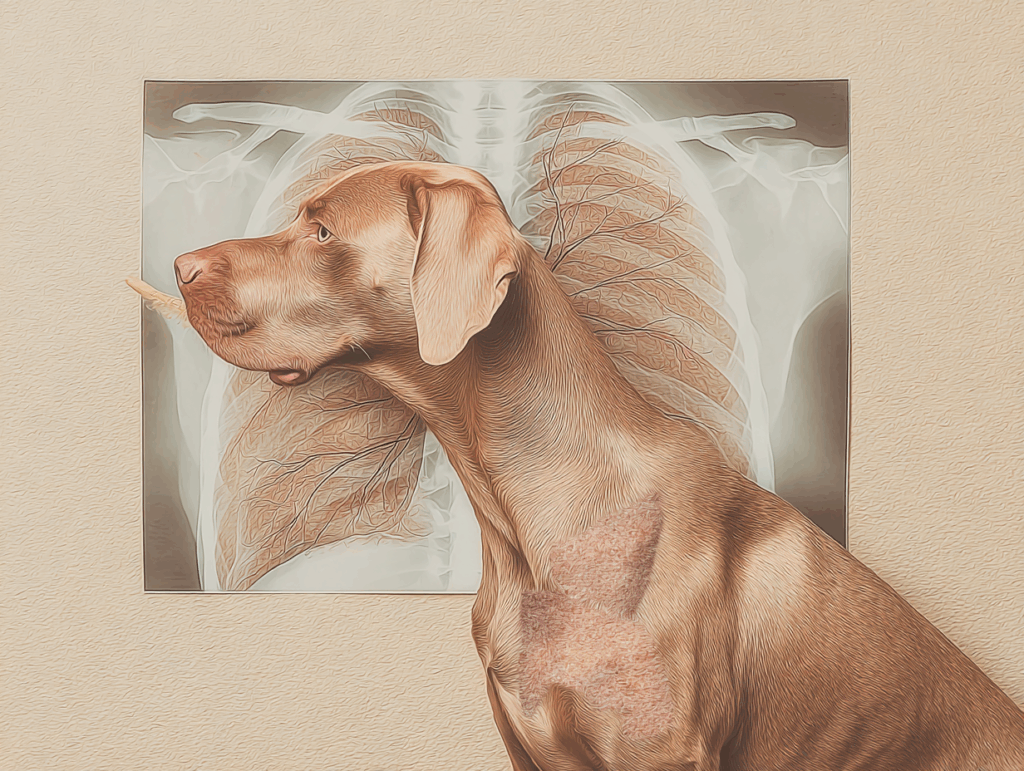
Okay, if you’ve made it this far and your pup is still sounding like an old engine trying to start, it’s time to peek a little deeper—like, dog’s lungs-level deep. Some coughs aren’t just noisy; they’re tied to bigger health conditions.
Aspiration Pneumonia: Oops, That Went Down the Wrong Pipe
Just like us, dogs can aspirate food, water, or vomit into their lungs. The result? Aspiration pneumonia, which causes coughing, fever, lethargy, and sometimes nasal discharge. It sounds dramatic—and it is. You’ll definitely want to book a vet visit if you suspect this one.
It’s especially a risk for flat-faced dogs or dogs with issues like soft palate abnormalities (we’re looking at you, bulldogs).
Canine Influenza Virus: Flu Season Hits Fido
Yep, your dog can catch the flu. The canine influenza virus is highly contagious and can cause coughing, sneezing, postnasal drainage, and even difficulty breathing. And just like with human flu, it’s no fun and spreads easily, especially in dog parks, boarding kennels, and grooming salons.
The good news? There’s a vaccine. Ask your vet if it’s right for your social butterfly.
Learn more about Canine influenza from our interview with Dr. Natalie Marks
Heartworm Disease: The Sneaky Culprit
You may think of mosquito bites as annoying, but for dogs, they can be life-threatening. Enter heartworm disease, a serious condition caused by parasites that settle in the dog’s lungs and heart. Coughing is often one of the first signs, especially after exercise.
Long-term, it can lead to congestive heart failure, which may bring on respiratory distress or a swollen belly. Treatment is available, but prevention (aka those monthly chewables) is way easier.
Lung Problems That Sound (and Look) Scary
Coughing that’s deep, wet, or productive might indicate a more serious condition like a lung disease, lung infection, or damage to lung tissue. These can include things like fungal infections, cancer, or chronic inflammation. All of them require professional evaluation—no DIY Google diagnosing, please.
If your dog has a heart condition, that can cause fluid buildup in the lungs too, another reason to stay on top of regular checkups.
5. Environmental Triggers in Your Chic Apartment
Look, sometimes your pup’s sniffles aren’t the result of some grand doggy illness. Sometimes, it’s just life in a cozy, candle-laden, diffuser-blasting, perfectly curated one-bedroom apartment.
That Air Freshener Might Be Too Fresh
If you’re a sucker for a seasonal plug-in scent, you’re not alone. But for your pup, strong smells like air fresheners and candles can irritate their upper airways and cause sneezing, coughing, or even watery eyes. And don’t even get us started on cigarette smoke, it’s a no for dogs, just like it’s a no for your lungs and white curtains.
Can Air Help? Yes, Actually
Investing in air purifiers can help reduce dust, dander, and other irritants in the air. Not only does it support your furry friend’s respiratory health, it might even improve your own sleep. Win-win.
Bites, Itches & It’s-Always-Something
Indoor allergens aren’t the only issue. Insect bites (think spiders, fleas, and those random bugs that sneak in during Chicago’s fake spring) can trigger sneezing fits or even a full-body reaction.
And let’s not forget about your dog’s skin. Skin allergies often go paw-in-paw with respiratory symptoms like coughing or nasal irritation. Same goes for things like ear infections—they can mess with your pup’s equilibrium and trigger sneezing or face rubbing.
If your dog is prone to allergic flare-ups or random “what is THAT rash?” moments, you’re not alone.
Scratching nonstop too? Here’s what might be causing the itch.=
6. When It’s Time to Book That Vet Visit
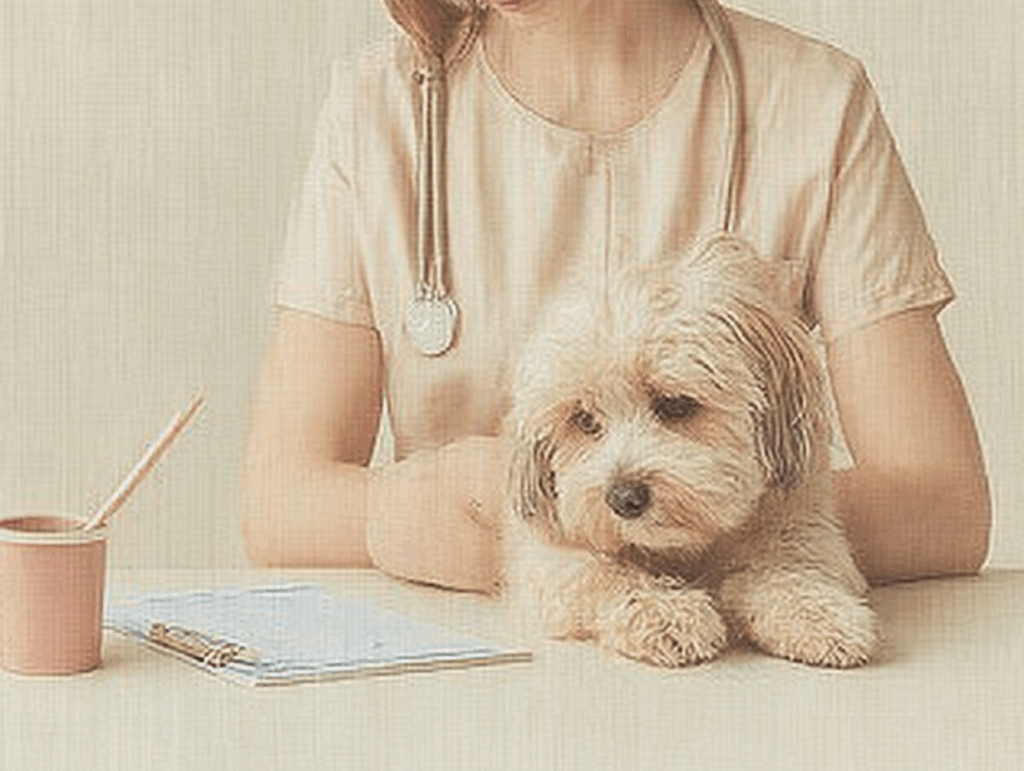
Okay, so your pup has been sneezing for three days straight, sounds like they swallowed a kazoo, and now they’re giving you the “I don’t wanna eat” eyes at dinnertime. Time to stop diagnosing via TikTok and pick up the phone.
When to Stop Googling and Start Dialing
If your dog has a loss of appetite or complete lack of appetite, it’s a red flag, especially if it’s paired with a persistent cough, labored breathing, or general lethargy. Throw in dry coughing or difficulty breathing, and it’s time to make that vet visit.
Worried about being “that dog mom” at the clinic? Don’t be. Vets would rather see a healthy pup than a sick one too late.
Bring the Receipts (aka the Cough Reel)
You know how your dog refuses to perform symptoms the moment you’re at the vet? That’s why a video of your dog coughing or sneezing at home is a total game-changer. It helps your vet understand what’s happening in real time, even when your pup suddenly pretends to be fine in the exam room.
What the Vet Might Do
Once you’re in, the vet will do a physical examination and might recommend blood tests, imaging, or even scopes, depending on how dramatic things have gotten. They’re looking for signs of an underlying cause, whether it’s infection, inflammation, or something more serious.
Luckily, most of these issues have solid treatment options—ranging from counter medications (hello, doggie Benadryl) to prescription cough suppressants and beyond. The important thing? Getting ahead of the issue before it spirals.
7. Boosting the Immune System and Preventing the Sniffles

Now that we’ve stress-sweated our way through all the possible doggy cough conspiracies, let’s talk about what you can do to prevent this nasal nonsense in the first place.
Immune Support = Mom of the Year Energy
Keeping your pup’s immune system strong is the foundation of good health (and fewer vet bills). That means quality food, daily movement, and, yes, the occasional immune-boosting supplement if your vet recommends it. Think probiotics, fish oil, and the doggy version of green juice, but with more tail wags.
Clean Space, Happy Snout
To avoid respiratory secretions and nose drama, keep your living space clean and well-ventilated. Regular vacuuming, switching out air filters, and minimizing exposure to irritants like air fresheners (yep, again!) can help your furry friend breathe easier.
If your dog has a history of upper respiratory tract infection or gets frequent occasional cough episodes, consider running a pet’s cough diary. Yep, you’re officially a dog mom now.
Say No to Germ Fests
While we’re not about to tell you to ban your pup from the park (we’re not monsters), you can be smart. Avoid shared water bowls, stay away from visibly sick dogs, and ask your vet if your pup should be vaccinated for canine influenza virus or infectious tracheobronchitis, especially if they’re a social butterfly.
Snot Happens—But You’ve Got This
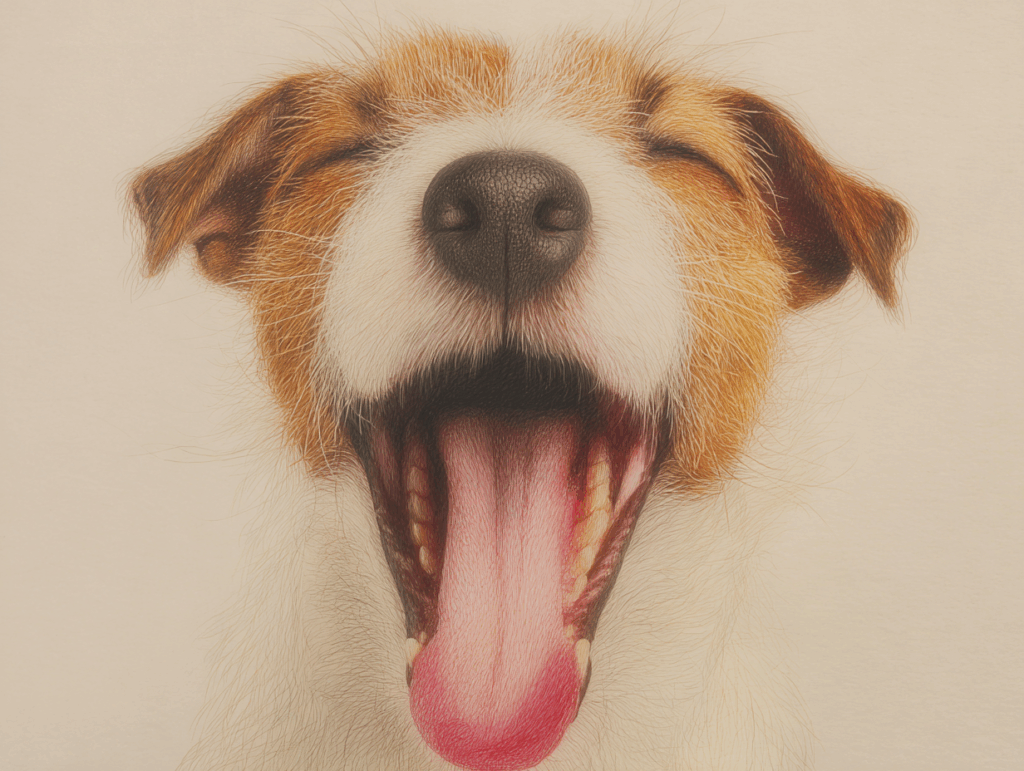
If your dog is coughing and sneezing, it doesn’t mean you’ve failed as a dog mom. It means you care, you’re observant, and you’re absolutely killing it in the “pet detective” department.
Whether it’s a tickle from a rogue dust bunny or something more serious like chronic bronchitis, remember: there are a number of reasons your furry friend might be sounding off. Most of the time, it’s manageable, treatable, and thanks to this blog post, totally understandable.
As a first-time pet parent, you’re doing amazing. You’ve got the tools to know what to look for, when to panic (rarely), and when to book that vet visit. Plus, you now know that your pup’s reverse sneeze doesn’t mean he’s dying—it just means he’s dramatic. And honestly? Same.
So go ahead, bookmark this post, send it to your fellow dog moms, and take a deep breath. You’re not alone on this sneezy, snorty journey.
Now give your pup a kiss on the nose (maybe wipe it first), and remember—you’ve got this.

